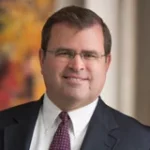 We are less than 24 hours out from 2024 and, after reflecting on what mattered in 2023 and other year-in-review recaps, it is now time once again to ponder what lies ahead. From exciting patent legislation to Supreme Court trademark and copyright cases that could have big implications, here is what the IPWatchdog community will be keeping on its radar in the new year.
We are less than 24 hours out from 2024 and, after reflecting on what mattered in 2023 and other year-in-review recaps, it is now time once again to ponder what lies ahead. From exciting patent legislation to Supreme Court trademark and copyright cases that could have big implications, here is what the IPWatchdog community will be keeping on its radar in the new year.
 Alden Abbott
Alden Abbott
Mercatus Center at George Mason University
“On the legislative and administrative fronts, I strongly doubt that patent legislation will move, and I expect that the Biden Administration will continue to advance anti-patent policy.
On the judicial front, the Supreme Court will render one decision of great interest to copyright holders and one decision of major significance to trademark holders. In Warner Chappell Music, Inc. v. Nealy, the Court will decide whether a copyright plaintiff can recover damages for acts that allegedly occurred more than three years before the filing of a lawsuit. And in Vidal V. Elster, the Court will decide whether the refusal to register a trademark under 15 U.S.C. § 1052(c) violates the Free Speech Clause of the First Amendment when the mark contains criticism of a government official or public figure.”
Megan Bannigan
Debevoise
“Penn State Univ. v. Vintage Brands will be an important case to watch in 2024 with far-reaching implications for the licensing industry, extending to colleges, universities, the sports world and beyond. The Middle District of Pennsylvania rejected Penn State’s motion to dismiss Vintage Brand’s counterclaim seeking to cancel Penn State’s trademark registrations on the grounds that they do not function as trademarks for certain categories of merchandise. The court found that Vintage Brands had plausibly alleged that the marks, including PENN STATE, when used on items like t-shirts and other merchandise, were purely ornamental and did not serve to identify source or sponsorship. The case awaits decisions on cross motions for summary judgment. The pivotal question is whether Vintage Brands’ use of Penn State’s marks on merchandise constitutes trademark use, with potential ramifications that would open the floodgates for third-party uses of trademarks in non-source identifying ways. The outcome will significantly affect the value of licenses to use university marks. This is a highly fact-intensive litigation and it seems likely at least some aspect will be set for a high-profile, must-watch trial, unless a settlement occurs.”
Brian Brookey
Tucker Ellis
“The Supreme Court will soon grapple with a case of great interest to copyright holders and practitioners: Warner Chappell Music, Inc. v. Nealey.
The Copyright Act imposes a three-year statute of limitations on infringement actions. Yet courts apply the “discovery rule” to permit plaintiffs to file lawsuits more than three years after infringement where they could not reasonably have discovered the infringement earlier. The Second Circuit has held that even so, a plaintiff may not recover damages for acts occurring more than three years before suit is filed. The Ninth Circuit uses the discovery rule to allow for damages regardless of how long ago the infringement occurred. In Warner-Chappell, the Eleventh Circuit adopted the latter approach.
Broad application of the discovery rule is the bane of those defending against copyright “trolls” seeking to extract years’ worth of damages. Music companies like Warner Chappell also frequently must fend off stale claims of infringement, years after records and witnesses have been lost. It is difficult to predict how the Court will rule. But a textualist like Justice Gorsuch, and a pro-business super-majority, may be predisposed to a stricter application of the discovery rule, in which damages beyond the three-year “lookback” are unavailable.”
Lori Cohen
Womble Bond Dickinson
“In addition to boasting luxurious guest rooms, The Guitar Hotel in Florida this year persuaded the Trademark Trial and Appeal Board (TTAB) that its design, the shape of a guitar, is inherently distinctive.
In August 2018, The Seminole Tribe of Florida sought registration on the Principal Register for the design. But the Examining Attorney refused registration, finding the mark to be nondistinctive trade dress. The Seminole Tribe appealed and the TTAB allowed the application for registration. Finding that the guitar design was inherently distinctive, the TTAB held that the design was ‘unique’ for a building and is a ‘type that consumers would immediately rely on to differentiate applicant’s services from casinos, hotel, bar and restaurant services offered by others, and that it therefore constitutes inherently distinctive trade dress.’
If a guitar-shaped hotel can enjoy protection as inherently distinctive, I look forward to more such groundbreaking, landmark and earth-shattering decisions in 2024!”
Andrew Gray
Morgan Lewis
“Artificial intelligence (AI) will remain the hottest topic in IP. While the questions that need to be answered about AI are evolving, one interesting area is how training data might be licensed in the future. Courts are currently addressing the question of whether unauthorized use of an author’s works to train an AI constitutes copyright infringement. In the years to come, we will learn the answer to not only that question, but also whether the training data author has any rights in creations generated by such an AI? As the courts continue to grapple with how to divvy up the rights in AI generated works, the early cases suggest that the owners of training data will not be able to rely on their copyrights to prevent the use of their works to train AIs. As this case law develops, we will all watch carefully to see whether the case law is consistent with our evolving attitudes and public policy regarding AI. Perhaps a market to license training data will emerge to address this and other related issues. However this turns out, it is going to be another exciting year in the world of AI!”
Robert Greenspoon
Dunlap Bennett & Ludwig
“National security and national competitiveness will enter IP policy debates like never before. China has discovered the destabilizing effect of targeted PTAB challenges. Recently patent owners have pushed back. A good example is magnesium processor Terves. In its preliminary patent owner response, Terves showed strong evidence that a member of the Chinese Communist Party owned the petitioner – a noncommercial entity attacking Terves’s magnesium processing patent without any prior adversarial relationship. What did the PTAB do? Institute, of course, even though magnesium processing is a protected industry under both Trump and Biden emergency executive orders. The stage is set for inquiry by Congress into why the PTAB disobeyed presidents of both parties to let a Chinese-government linked entity weaponize the Patent Office against a protected domestic operating company in a security-critical metals processing industry.”
Marla Grossman
The American Continental Group, Inc.
“Anticipation is high with the patent community for the forthcoming rulings from the USPTO concerning artificial intelligence (AI) and inventorship. My crystal ball projections for 2024 are that the USPTO will rule as follows:
- Existing law dictates that only natural persons can be designated as inventors.
- AI systems are not currently eligible for inventorship recognition.
- The utilization of an AI system in the invention creation process is akin to the use of other technical tools, with the potential distinction being limited to technical efficiency, having no discernable impact on its legal or regulatory implications.
- Given that current law offers sufficient guidance, the USPTO will not extend its present guidance on inventorship to accommodate scenarios where AI significantly contributes to an invention.
- Additionally, the USPTO will refrain from recommending alterations to current inventorship laws in response to AI advancements, treating AI on par with other technical tools in the innovation landscape.”

Efrat Kasznik
Efrat Kasznik
Foresight Valuation Group
“In previous years, my predictions for this column used to center on new types of assets being developed, or new technologies taking center stage. This year my prediction is about going back to the basics, or more specifically: patents are making a comeback. We often get involved in IP valuations at the monetization point (licensing/sale, M&A or funding), where we see a clear return of the large patent portfolio (global, diversified portfolios of 50-100 assets or more) as a central element in a business strategy. Patents are definitely having a moment, and investors are paying attention. This trend is particularly visible in old-school “low tech” industries, like construction, where companies are looking to disrupt traditional industries and are using patents to create a moat around their product. This trend is also visible in industries that rely on patents more frequently, like cleantech and aviation, where companies are actually spending time and money to craft a robust patent portfolio before going to market, closely aligned with product development. This trend is poised to become more prevalent in 2024, as funding is getting harder and companies need to show more value in their assets.”
Steve Kunin
Maier & Maier
“I expect that Kathi Vidal will continue to make reforms at the PTAB particularly in AIA trials practice. Many of the reforms will take place using the rulemaking process rather than via PTAB informative and precedential decisions. We should continue to watch what happens in Congress in their legislative efforts to make AIA trials more fair and balanced to patent owners and petitioners.”
Edward Lanquist
Baker Donelson
“That AI is merely another new technology. Like any other technology, IP basics will provide how we protect and defend it. Until we get more clarification about Alice and Myriad, we will apply existing software patentability standards to patentability issues surrounding AI.”
Mark Lezama
Knobbe Martens
“I’m looking forward to the en banc decision in LKQ. From the sheer number of questions the Federal Circuit requested briefing on, it seems likely we’ll see at least some change in the law on design-patent obviousness or how it is applied. I’m also waiting to see whether the Federal Circuit will rehear In re Cellect en banc, which could have important implications for patent term adjustment. And it will be interesting to see whether the Supreme Court grants cert in Intel v. Vidal, which asks whether, even when no institution decision is challenged, § 314(b) precludes judicial review of APA challenges to PTO practice.”
Eli Mazour
Harrity & Harrity
“While the administration embraced undermining IP rights in 2023, Senators Coons and Tillis worked to find bipartisan consensus on ways to improve America’s patent system. Reintroducing PERA to fix Section 101 and the PREVAIL Act to improve how the PTAB operates were the fruits of those efforts.
In 2024, I will be watching to see if Coons, Tillis, and their pro-patent allies are able to continue to build momentum for one or both of these bills in the Senate and the House. Although the safer bet is that neither bill will pass in 2024, the bills will be ready to be embraced by those that want to get something positive done this Congress to support American innovation.”
Andrew McElligott
Crowell & Moring
“I predict that we will see an increased interest from patent owners in utilizing the International Trade Commission (“ITC”). The ITC is recognized as an important forum for patent litigation, but one that sometimes flies under the radar. This past year, however, the ITC issued an order in In the Matter of Certain Light-Based Physiological Measurement Devices and Components Thereof, investigation number 337-TA-1276, that could prohibit imports of certain Apple Watch products. The potential impact of the decision on a popular consumer product has garnered media headlines well-beyond the legal world, and refocused a spotlight on the power of the ITC.
In the past, Apple cases have created similar trends in the legal world. For example, Apple’s well-documented success in asserting its design patents that cover the iPhone spurred other companies to invest in this type of design protection and to enforce it. Regarding patent litigation, in particular, there was a significant spike in the filing of design patent cases in the years following Apple’s success. Although Apple lost in this instance before the ITC, I predict the notoriety of the case will have a similar impact, spurring other companies to utilize the ITC to assert their patent rights.”
Daniel Shores
Rothwell Figg
“Given the downturn in biotech investor funding, I would anticipate an increase in startup and startup asset acquisition by big pharma and other well-positioned biotech companies.
On another front, discovery in the myriad of mRNA / lipid nanoparticle litigations will be in full stride in 2024 pushing those matters closer to critical decision points as key facts are established and consideration is given to whether the parties will settle or participate in high-stakes trials.
Finally, I’d keep an eye on big pharma’s reaction to the head-on attack on biotech IP rights by the White House and legislators in Congress. The assault is unprecedented – and many feel unreasonable – and it will be interesting to see whether any new laws and policies are actually implemented or whether these initiatives are shot down as meritless and causing a lot more harm than good.”
Gary Sorden
Cole Schotz
“I expect 2024 will lead to continued uncertainty and lack of predictability in numerous areas of patent law including §101 jurisprudence, damages, PTAB, and the inability to obtain injunctions where applicable. The key focus should be on Congress in 2024 as there is a need to balance the patent system and return the system towards stronger patent rights. Very few patent owners can withstand the amount of risk, time, and money needed to advance patent rights in various venues. While some call for the need to change litigation funding as an issue, the real issue is that without litigation funding most patent owners cannot exercise their right to a jury trial that is provided for in the Constitution.
Section 101 must be fixed as it has morphed from a simple statute to something that is swallowing the whole of patent law. In addition, the ITC remains a critical option for companies looking to protect their business and is, in practice, the only remaining venue where an injunction can be obtained. My hope is that in 2024 the patent bar works to provide more certainty to the patent regime as a whole.”
Wendy Verlander
Verlander
“In 2024, most importantly, I will be watching to see what happens to the PREVAIL and PERA bills. There is some disagreement within the patent community about their effectiveness, which may result in non-enactment. Personally, I believe they are the most consequential patent bills proposed in recent memory that actually have a chance of success.
Beyond that, Delaware will likely decrease in popularity as a venue for patent plaintiffs due to its unique disclosure requirements and the zeal with which they have been enforced. By contrast, it appears that WDTX will continue to experience great popularity in spite of its local rule randomly assigning Waco patent cases among the various district judges. Depending on the results of the investigation into Judge Newman, there could be an opening for a new Federal Circuit Judge. We will also likely see more dramatic reductions in jury awards, a continued denial of cert in patent eligibility cases, and many additional cases transferred for convenience. And, in Loper, the Supreme Court will overturn or, more likely, limit deference to administrative agencies’ interpretation of statutes delegated to them, which could severely restrict the PTO’s ability to promulgate rules.
Much to watch for in 2024!”
Daniel Weinberg
Hopkins & Carley
“2024 should be a big year for artificial intelligence in IP law. Will we see Congress take up issues relating to the protection for inventions created by artificial intelligence given rulings that patents can issue only to human investors? Will we receive further guidance on copyright protection for works created by generative AI? Will businesses turn to trade secrets law for the protection of AI-generated information and inventions instead of patent law? And they do, is the resulting information or invention not generally known or readily ascertainable when it was created by a generative AI tool. Lastly, we should expect to see an increased role in the use of artificial intelligence in the practice of law itself. While counsel have been warned against becoming overly reliant on artificial intelligence in drafting pleadings and motions, there is no question we will see an increase in the usage of artificial intelligence in the practice of law in 2024.”

![[IPWatchdog Logo]](https://ipwatchdog.com/wp-content/themes/IPWatchdog%20-%202023/assets/images/temp/logo-small@2x.png)

![[Advertisement]](https://ipwatchdog.com/wp-content/uploads/2024/04/UnitedLex-May-2-2024-sidebar-700x500-1.jpg)
![[Advertisement]](https://ipwatchdog.com/wp-content/uploads/2024/04/Artificial-Intelligence-2024-REPLAY-sidebar-700x500-corrected.jpg)
![[Advertisement]](https://ipwatchdog.com/wp-content/uploads/2024/04/Patent-Litigation-Masters-2024-sidebar-700x500-1.jpg)

![[Advertisement]](https://ipwatchdog.com/wp-content/uploads/2021/12/WEBINAR-336-x-280-px.png)
![[Advertisement]](https://ipwatchdog.com/wp-content/uploads/2021/12/2021-Patent-Practice-on-Demand-recorded-Feb-2021-336-x-280.jpg)
![[Advertisement]](https://ipwatchdog.com/wp-content/uploads/2021/12/Ad-4-The-Invent-Patent-System™.png)






Join the Discussion
4 comments so far.
Simon Baker
March 27, 2024 01:51 pmIt still remains fuzzy to me whether our laws in 2024 honor “first to invent” or “first to patent” in terms of right to patent IP. Any clarification would be appreciated.
concerned
January 1, 2024 05:06 amThe NFL refs had a blown call this weekend in the Lions/Cowboy game. The error may have playoff game consequences. People make mistakes. Unfortunately, the NFL refs cannot go back on Monday and have a “do-over.”
SCOTUS can go back and reverse a decision or provide clarification of their decisions. Yet, SCOTUS will not even consider either possibility. SCOTUS is beyond reproach on Alice.
If SCOTUS thinks Alice is the right decision, the public has a right to hear clarification. Hoping a divided Congress will agree to anything is not the public’s reasonable solution to get an Alice reversal or an Alice clarification.
concerned
January 1, 2024 03:41 amMr. Greenspoon wrote a beautiful amici on behalf of my SCOTUS petition at the request of U.S. Inventor. I am thankful to both parties and my attorney B for their efforts, albeit my petition was denied.
My common folk friends would not understand the patent legal mumbo jumbo. What my friends do understand is the following question:
There have been 80+ petitions asking for s101 clarification from SCOTUS since Alice. Every petition request has been denied making the requests 0 for 80+. Do you think the 80+ high power law firms across the nation (people like Mr. Greenspoon) are all idiots or is it more probable that SCOTUS blew the Alice decision and SCOTUS will not admit their mistake? This would be the flip flopping abortion SCOTUS.
My friends all give the same answer. None of them have ever pursued a patent (lucky for them), however, many of these friends have experienced in life an authority who overstepped their authority, then dug in.
Everyone of my friends also understands this observation: If SCOTUS really only interprets the law, not legislate the law from the bench, why do both political parties fight like mad to get their person on the bench?
It is a shame what patent law has become in the United States. I was told I receive some kind of due process. I also know in life when I am getting screwed. From the contributors’ remarks above, these contributors also know when they are getting the do-si-do.
Julie Burke
December 31, 2023 05:15 pmYes, and taking Robert Greenspoon’s insightful comment one step further, see
https://thehill.com/opinion/technology/4379360-why-is-the-us-patent-system-working-against-us-interests/